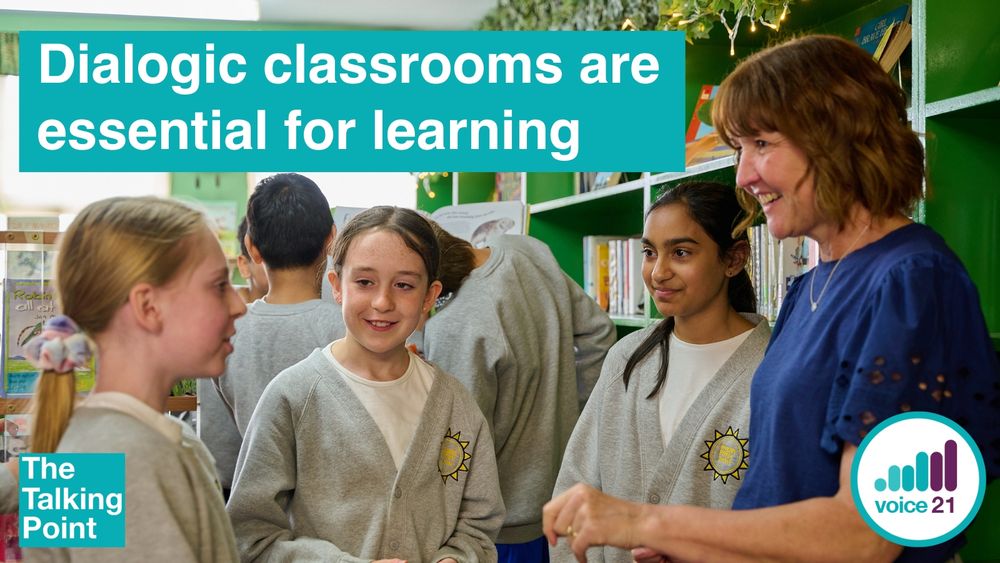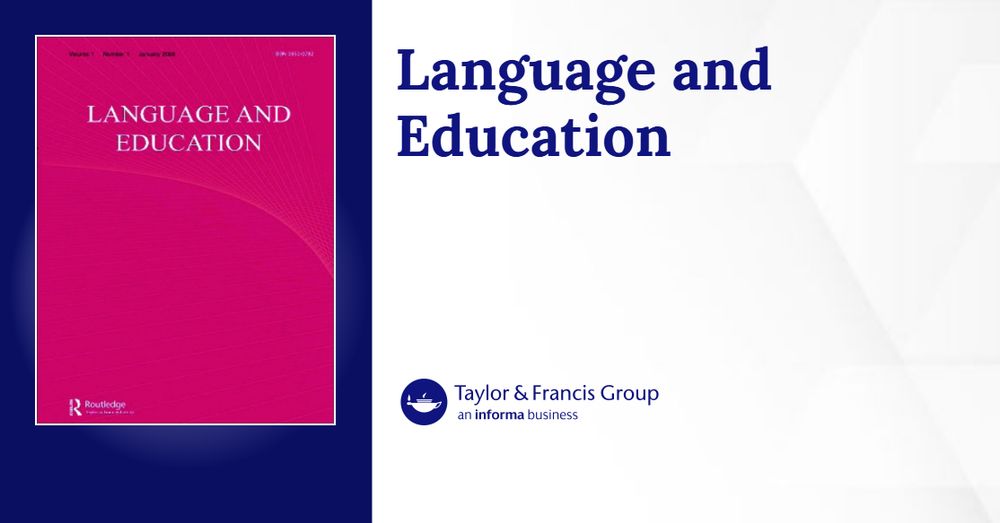Julia Snell
@snelljulia.bsky.social
Professor of Sociolinguists at the Uni. of Leeds, UK. Researching language, identity, education & inequality.
Yes! I’ll DM you the details
November 10, 2025 at 3:36 PM
Yes! I’ll DM you the details
Hi Elisabeth, I’ve added your email to the Teams invite, which hopefully you have received?
October 21, 2025 at 10:12 AM
Hi Elisabeth, I’ve added your email to the Teams invite, which hopefully you have received?
Hi, yes of course. I’m going to follow up on some organisational aspects this week, including the online set up, so I hope to have the link soon
October 14, 2025 at 9:58 AM
Hi, yes of course. I’m going to follow up on some organisational aspects this week, including the online set up, so I hope to have the link soon
If you won’t be in Leeds, we’re hoping to livestream and record. Drop me a message if you’d like the link
October 14, 2025 at 9:14 AM
If you won’t be in Leeds, we’re hoping to livestream and record. Drop me a message if you’d like the link
Reposted by Julia Snell
According to @snelljulia.bsky.social:
“Pupils who experience dialogic teaching and learning will develop their oral language skills, gain confidence and build relationships (by becoming more patient and attuned to others’ perspectives)."
Read full article here 👇
voice21.org/voice-21-lau...
“Pupils who experience dialogic teaching and learning will develop their oral language skills, gain confidence and build relationships (by becoming more patient and attuned to others’ perspectives)."
Read full article here 👇
voice21.org/voice-21-lau...

July 4, 2025 at 11:07 AM
According to @snelljulia.bsky.social:
“Pupils who experience dialogic teaching and learning will develop their oral language skills, gain confidence and build relationships (by becoming more patient and attuned to others’ perspectives)."
Read full article here 👇
voice21.org/voice-21-lau...
“Pupils who experience dialogic teaching and learning will develop their oral language skills, gain confidence and build relationships (by becoming more patient and attuned to others’ perspectives)."
Read full article here 👇
voice21.org/voice-21-lau...
Thanks. Would love to hear your thoughts if you do!
July 3, 2025 at 8:55 PM
Thanks. Would love to hear your thoughts if you do!
And thanks to @iancushing.bsky.social
for feedback on an early draft and for general encouragement, collegiality and inspiration!
for feedback on an early draft and for general encouragement, collegiality and inspiration!
July 2, 2025 at 6:49 PM
And thanks to @iancushing.bsky.social
for feedback on an early draft and for general encouragement, collegiality and inspiration!
for feedback on an early draft and for general encouragement, collegiality and inspiration!
Thanks for reading, please do look at the full article, available open access here: www.tandfonline.com/doi/full/10..... This research was supported by a @leverhulme.ac.uk Research Fellowship.

Using linguistic ethnography to uncover the mechanisms through which underprivileged students are denied access to classroom dialogue
This article opens up the ‘black box’ of classroom interaction to investigate why opportunities to participate in academically productive (or ‘dialogic’) classroom discussion may be more readily av...
www.tandfonline.com
July 2, 2025 at 6:49 PM
Thanks for reading, please do look at the full article, available open access here: www.tandfonline.com/doi/full/10..... This research was supported by a @leverhulme.ac.uk Research Fellowship.
It is crucial that we develop this approach in educational research and build an ethnographic evidence base that can challenge deficit thinking and better inform educational policy and decision making.
July 2, 2025 at 6:49 PM
It is crucial that we develop this approach in educational research and build an ethnographic evidence base that can challenge deficit thinking and better inform educational policy and decision making.
Linguistic ethnographic research is important in leading this change. It rejects universalizing assumptions about students and seeks to understand the complex and intricate ways in which local classroom practices connect with the wider institutional and sociopolitical order.
July 2, 2025 at 6:49 PM
Linguistic ethnographic research is important in leading this change. It rejects universalizing assumptions about students and seeks to understand the complex and intricate ways in which local classroom practices connect with the wider institutional and sociopolitical order.
However, ideologies & educational reforms do not influence classroom practice in a linear ‘top down’ way; there is negotiation in classrooms between bottom-up meaning making processes & broader institutional and socio-political processes, which opens up possibilities for change.
July 2, 2025 at 6:49 PM
However, ideologies & educational reforms do not influence classroom practice in a linear ‘top down’ way; there is negotiation in classrooms between bottom-up meaning making processes & broader institutional and socio-political processes, which opens up possibilities for change.
These three mechanisms have relevance beyond the focal schools since they are underpinned by widespread beliefs/ideologies about underprivileged students and systemic pressures (e.g. frequent student testing, league tables) that influence classrooms internationally.
July 2, 2025 at 6:49 PM
These three mechanisms have relevance beyond the focal schools since they are underpinned by widespread beliefs/ideologies about underprivileged students and systemic pressures (e.g. frequent student testing, league tables) that influence classrooms internationally.
Yet, in peer-group conversations recorded on the margins of classroom activity, these students showed themselves to be mature and independent thinkers with a propensity for dialogue.
July 2, 2025 at 6:49 PM
Yet, in peer-group conversations recorded on the margins of classroom activity, these students showed themselves to be mature and independent thinkers with a propensity for dialogue.
Student characteristics (e.g. laziness), behaviour (e.g. not listening), or (lack of) ability were invoked as reasons for their lack of understanding or missed learning opportunities, thus obscuring the need for institutional or systemic change.
July 2, 2025 at 6:49 PM
Student characteristics (e.g. laziness), behaviour (e.g. not listening), or (lack of) ability were invoked as reasons for their lack of understanding or missed learning opportunities, thus obscuring the need for institutional or systemic change.
Third, in line with neoliberal accountability logics, students at the Lower SES school were held responsible for education failures.
July 2, 2025 at 6:49 PM
Third, in line with neoliberal accountability logics, students at the Lower SES school were held responsible for education failures.
The Lower SES school prioritised compliance and rote following of procedure over independent student thinking. The students were perceived to be immature, lacking in ability, and prone to disobedience; thus, their voices, bodies & behaviour were micromanaged.
July 2, 2025 at 6:49 PM
The Lower SES school prioritised compliance and rote following of procedure over independent student thinking. The students were perceived to be immature, lacking in ability, and prone to disobedience; thus, their voices, bodies & behaviour were micromanaged.
Second, there were competing approaches to managing classroom roles, routines & relationships. Students in both schools were expected to show respect for the teacher, but boundaries between teacher and student were more clearly demarcated and enforced at the Lower SES school.
July 2, 2025 at 6:49 PM
Second, there were competing approaches to managing classroom roles, routines & relationships. Students in both schools were expected to show respect for the teacher, but boundaries between teacher and student were more clearly demarcated and enforced at the Lower SES school.
At the Higher SES school, there was space for students to participate in classroom talk, but at the Lower SES school, student talk was actively discouraged and often met with reprimands and punishment, which had enduring effects on students.
July 2, 2025 at 6:49 PM
At the Higher SES school, there was space for students to participate in classroom talk, but at the Lower SES school, student talk was actively discouraged and often met with reprimands and punishment, which had enduring effects on students.
Close analysis of classroom interaction across both schools identified three mechanisms driving disparities in student participation. First, there were different assumptions about the purposes of classroom talk and how students should participate.
July 2, 2025 at 6:49 PM
Close analysis of classroom interaction across both schools identified three mechanisms driving disparities in student participation. First, there were different assumptions about the purposes of classroom talk and how students should participate.

